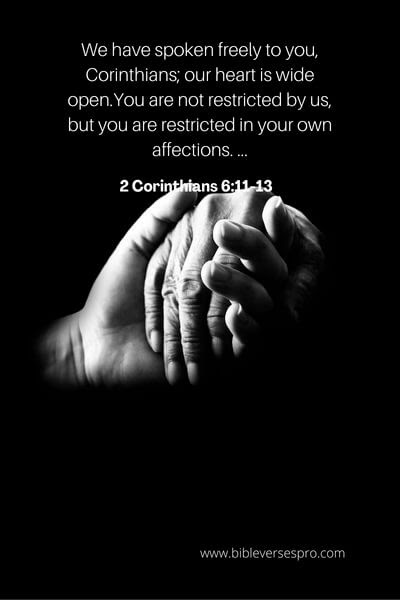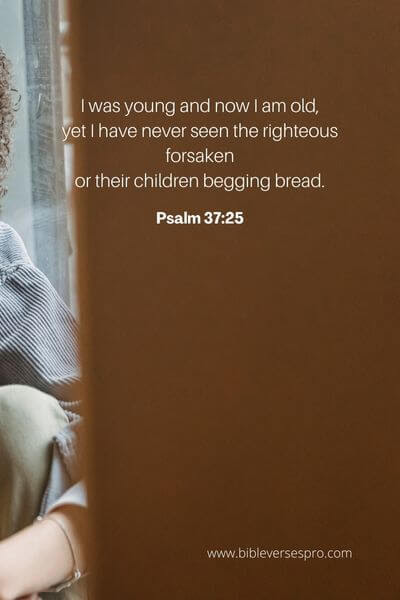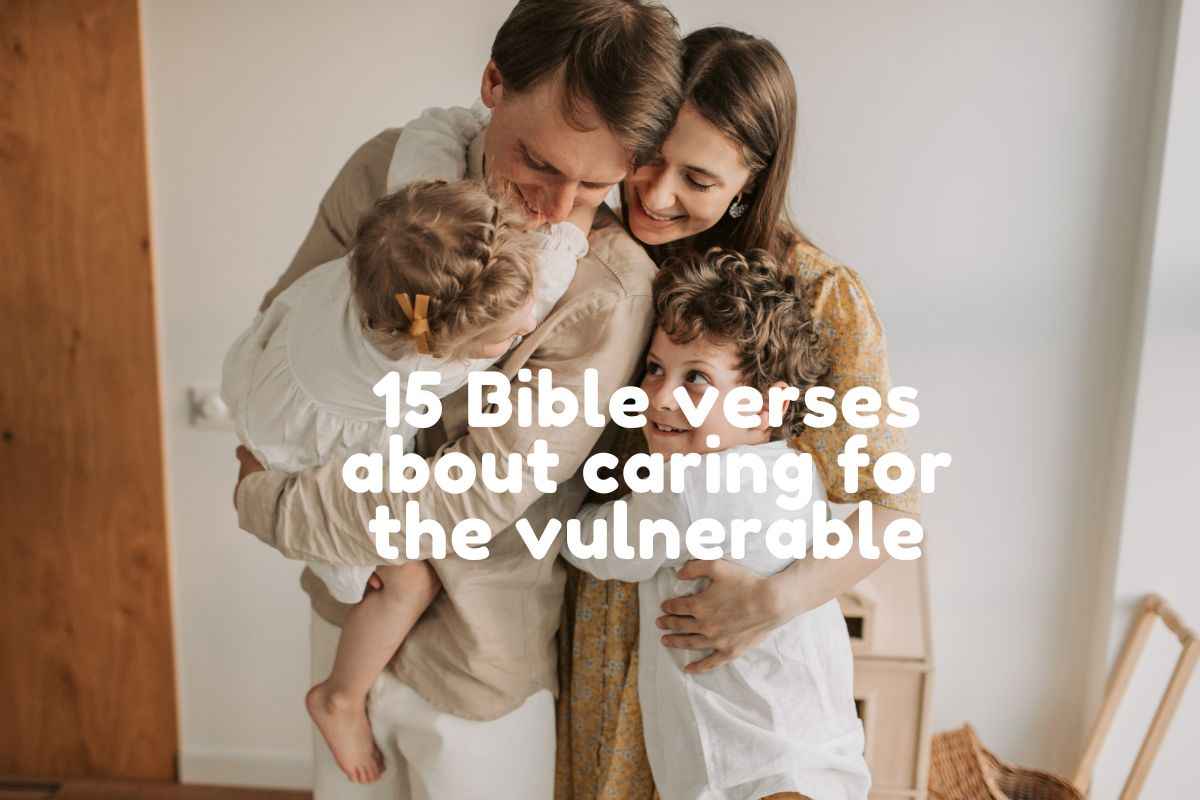Table of Contents Show
The Bible is filled with verses about caring for the vulnerable, which includes the poor, the elderly, the sick, the widowed, the orphaned, and the marginalized. Throughout the Old and New Testaments, there are numerous examples of God’s concern for the vulnerable and the call for His followers to show compassion and provide for their needs.
Caring for the vulnerable is rooted in the character of God, who is described as a defender of the weak and a provider for those in need. The Bible teaches that caring for the vulnerable is a moral obligation and a reflection of one’s faith and obedience to God.
Some of the most well-known Bible verses about caring for the vulnerable include Matthew 25:40, which states, “Truly I tell you, whatever you did for one of the least of these brothers and sisters of mine, you did for me.” This verse emphasizes the importance of serving and helping those in need as an act of service to God.
Another well-known verse is James 1:27, which states, “Religion that God our Father accepts as pure and faultless is this: to look after orphans and widows in their distress and to keep oneself from being polluted by the world.” This verse highlights the importance of caring for the most vulnerable members of society, including orphans and widows.
Other verses about caring for the vulnerable include Proverbs 31:8-9, Isaiah 1:17, Psalm 82:3, and Deuteronomy 24:19-22. These verses emphasize the importance of justice, compassion, and kindness toward those in need.
Bible verses about caring for the vulnerable
2 Corinthians 12:9-10
But he said to me, “My grace is sufficient for you, for my power is made perfect in weakness.” Therefore I will boast all the more gladly of my weaknesses, so that the power of Christ may rest upon me. For the sake of Christ, then, I am content with weaknesses, insults, hardships, persecutions, and calamities. For when I am weak, then I am strong.
2 Corinthians 12:9-10(ESV)

Paul was serving the Lord well, but God was aware of every man’s motives, and He foresaw that Paul might grow arrogant due to the significant revelations that God was revealing to the Church through him. The mysteries that Paul was being shown had been kept secret for ages and generations but were now being revealed to the saints of God through Paul.
It makes sense that the Lord would give Paul a thorn in the flesh that would push the limits of his endurance while subjecting him to various trials and tribulations.
The answer Paul received from the Lord Jesus was very different from his anticipated response. Even though the Lord would not remove this “thorn in the flesh,” Paul was told that he would be given God’s grace to bear it.
In areas where we are most vulnerable or experiencing the most suffering, believers must have the most faith in God. When there is no human solution for overcoming what we face, God’s might is never more apparent. Similarly, illogically, Christians who trust God are at their strongest when they have the least self-confidence. The might of God is unquestionably superior to our own.
James 5:16
Therefore, confess your sins to one another and pray for one another, that you may be healed. The prayer of a righteous person has great power as it is working.
James 5:16(ESV)

James keeps urging his readers to acknowledge their reliance on God. By joining in prayer, this is accomplished. He instructed them in earlier lines to respond to the difficulty by praying to God, to cheerfulness by singing songs of praise, and to sickness or spiritual weakness by asking church elders to pray for them.
James says Christians should regularly confess their faults to one another and pray for one another to be healed in this verse. Some Bible scholars interpret the term “healed” in this passage to mean recovery from a medical ailment. Others interpret it to indicate recovery from hopelessness and spiritual weakness.
If more of us prayed for one another, in family love, to overcome our particular sins, the church would be much healthier. After all, James claims, prayer is effective. God hears and answers prayers. A decent person’s prayer is potent and successful because God hears it and responds.
2 Corinthians 6:11-13
We have spoken freely to you, Corinthians; our heart is wide open.You are not restricted by us, but you are restricted in your own affections. In return (I speak as to children) widen your hearts also.
2 Corinthians 6:11-13(ESV)

Paul shows a lot of heart and love in these verses and the ones that follow. He accepts responsibility for speaking openly to them. He hasn’t withheld anything, in other words, to spare their feelings. The stakes are too great to be more concerned with compassion than with truth, as he has made apparent. Anyone among them who does not put their complete trust in Christ to atone for their sins runs the risk of missing out on God’s grace.
Despite any differences between him and the Corinthians and the fact that he has talked so openly, Paul said that his heart is still open to them, and He still feels the same way about them. Paul has stated that the Corinthians are welcome into his heart and the hearts of his fellow laborers for Christ. He implies that they feel the same level of love and compassion for the Christians at Corinth as they did in the past.
This holds regardless of any issues they may have had or how openly he may have written to them to resolve any issues. Paul has stated that the Corinthians are not the same. Their hearts have been closed to him and his ministry colleagues. Some Corinthians had lost at least some of their love for Paul, either out of resentment for his pointing out their spiritual mistakes or because some of them spread false teaching.
At this point, Paul exhorts them to broaden or open their hearts to him as well. Paul refers to the Corinthians as his spiritual children when he states that he addresses them as children (2 Corinthians 12:14–15). As a good father does with his children, he wants a close, sincere, and loving relationship with them.
Galatians 6:2
Bear one another’s burdens, and so fulfill the law of Christ.
Galatians 6:2(ESV)

Paul is instructing the Galatian Christians on how to coexist peacefully as Spirit-filled followers of Christ. He instructed them to intervene when someone is caught in sin in the preceding verse so that they can be brought back to walking in the Spirit.
He now exhorts them—and, by extension, all Christians—to support one another in bearing one another’s hardships. It indicates that even though we are in Christ, we still face challenges in our daily lives. We shall. The weight of our temptation to succumb to sin and the difficulty of resisting it are two of those difficulties. Paul wished us to share that weight rather than fight temptation and sin alone.
We also bear other loads, and occasionally we experience periods when those burdens become too great for us to bear. Such burdens include relationship, money, health, or emotional challenges. While God’s Spirit undoubtedly provides us the strength to handle these problems, God also desires to provide for people in Christ by enabling us to support one another.
We may incorrectly believe that being a Christian obligates us to always rely on ourselves. Paul will say in a few verses that we do need to bear the burden of our obligations in Christ. However, Christians are also called to support one another when our burdens become too great.
John 13:34-35
A new commandment I give to you, that you love one another: just as I have loved you, you also are to love one another. By this all people will know that you are my disciples, if you have love for one another.”
John 13:34-35(ESV)

Jesus gave a “new” or unheard-of command: “Love one another as I have loved you.” He gave his followers the best example of how to love and live for others in a way that would drive someone to sacrifice their life for them. Jesus set the example for the love this new commandment required via his life and death.
Jesus possessed agape love, which is a self-sacrificing love founded on principles. He was prepared to sacrifice his own life for his followers. Throughout the years of his public ministry, he did good deeds for his fellow humans, focusing mainly on spiritual instruction and assistance.
Therefore, his followers should follow his example and refrain from holding back until a situation calls for doing good for one’s neighbor. Christians should instead take the initiative and actively work for the welfare of their fellow human beings, especially by modeling their actions after those of Jesus while teaching and preaching and by doing so, contributing to the spiritual well-being of others. But most importantly, Jesus’ followers were to be kind to one another. They had to be exceptional in their love for one another.
Psalm 37:25
I was young and now I am old,
yet I have never seen the righteous forsaken
or their children begging bread.Psalm 37:25(NIV)

David is not saying that the “righteous” will never go through adversity or even die (Psalm 34:19). His meaning is actually in the context of healing. David is not necessarily referring to an absolute state of the entire world but rather to his observations. We know famines that have affected some countries, and Christians and non-believers have perished from starvation. Even people who honor God might be affected by poverty and dire circumstances.
Believers shouldn’t worry about what they should eat, drink, or wear because their heavenly Father is aware of their needs and has promised to satisfy them. God, of course, provides adequately for His people. That provision does not always follow our preferences or expectations.
Psalm 82:3
Defend the weak and the fatherless;
uphold the cause of the poor and the oppressed.Psalm 82:3(NIV)

God commands the earth’s judges to fulfill their responsibilities by standing up for those frequently subjected to unfair treatment. The underprivileged and fatherless people were frequently the subjects of harsh treatment in Asaph’s time. The judges’ responsibility was to stand up for them and render justice to the disadvantaged and poor. Judges are powerful in authority for the betterment of the community. They serve as the agents of God’s providence, maintaining law and order and, in particular, punishing evildoers and defending the well-off. God guides good rulers and judges who have good intentions, and God restrains evil ones who have bad intentions.
In those governors whom God appoints to rule over us, we are to submit to their authority. However, nothing beneficial can be anticipated when justice is twisted from what is just. The bad deeds of public figures cause public mischief. God asks us to treat the oppressed and needy with justice because they deserve it, not because they are poor or in need.
Proverbs 31:8
Speak up for those who cannot speak for themselves,
for the rights of all who are destitute.Proverbs 31:8(NIV)

Anyone trying to “speak up” these days faces great difficulty due to the polarized nature of politics. Whether or not we are rulers, God trusts us to say what must be stated. When there is injustice and oppression, the Church has a specific responsibility to God to speak truth to authority. Influential individuals today, including the Church itself, are concerned. Few people speak out against real injustice, but many do so for politically correct and social justice warriors’ invented issues. But God exhorts us to muster the strength to speak up. God expects much, especially from those who can effect change. Why do we need power? Justice is being served.
There are numerous causes for why someone can’t speak for themselves. We must support them and work to allow them to speak for themselves. Particularly nowadays, impoverished people have chosen to get that way; they still have rights. They still bear God’s image, and God values them because of this. As we recognize Christ in the impoverished brother or sister, if their rights are violated, they will be unable to defend themselves and should be protected by those who can.
Isaiah 1:17
Learn to do right; seek justice. Defend the oppressed.[a] Take up the cause of the fatherless; plead the case of the widow.
Isaiah 1:17(NIV)

The words are still primarily directed at men in positions of authority. The “fatherless” and the “widow,” typical examples of the defenseless, should find an advocate in the judge; they are instructed and must be faithful to their calling. Do him justice by supporting his cause. Do not take advantage of his vulnerable and helpless state, which includes his lack of knowledge and experience.
Due to the ability of orphan guardians to exploit or mistreat children without being caught or punished, this allegation was especially relevant. Orphans are uneducated. God commanded their guardians to befriend and treat them fairly because their parents are their natural protectors. A weak or corrupt legal system always leaves those without natural defenses vulnerable to wrongdoing.
The judge is responsible for defending such cases, but everyone with clout in the neighborhood is also obligated to do so. The prophet demands that his listeners, who are described as “rulers” and “people” in Isaiah 1:10, perform the basic civic virtue of citizenship by “seeking judgment.” Social righteousness is the kind of righteousness he demands.
Bible verses about helping the vulnerable
Proverbs 12:10
The righteous care for the needs of their animals, but the kindest acts of the wicked are cruel.”
Proverbs 12:10(NIV)

A core element of biblical ethics is this. Retaliation never yields positive results. It simply fuels more rage and intensifies a negative cycle of violence. The power of choosing to respond in love is far greater.
People try to harm one another when they hate one another. They fight and hurt each other. Even a congregation of believers can experience this tragedy. Hatred separates and undermines the community. Hatred undermines a congregation’s testimony and damages Christianity in the eyes of non-believers. Hatred is a devil’s tool. On the other hand, love conceals sins and transgressions. It’s crucial to remember that no matter how terrible the sin is, love does not overlook it.
This scripture does not advocate minimizing or “covering up” sin. However, love never stops looking for points of agreement and cooperative strategies. It patiently awaits a transgressor’s understanding of his wrong and subsequent repentance. It is ready to pardon. As much as it is possible and appropriate, love motivates us to work toward oneness (John 17:21)
Love, according to Jesus, is proof that one is a part of Him. He declared, “A new commandment I offer to you is this: I command you to love one another, just as I have loved you. If you show love for one another, everyone will know you are my disciples.
Luke 12:33-34
“Sell your possessions and give to the poor. Provide purses for yourselves that will not wear out, a treasure in heaven that will never fail, where no thief comes near and no moth destroys. For where your treasure is, there your heart will be also.”
Luke 12:33-34 (NIV)
The mandate to give away everything we own is a test for discipleship and a means of disciplining us. Giving is suggested as a remedy or treatment for covetousness. God’s people can contribute freely because of their eternal perspective and the coming kingdom they will hold. They can hold their belongings with ease. They may even sell them and give the proceeds to the needy. By doing this, they will give themselves access to a treasure stored in heaven that cannot be lost. Jesus’ advice to his followers was to sell whatever they could to make it possible to give to the needy rather than to sell all of their assets.
Whatever is accomplished on earth will have eternal value, the “treasure.” Acts of obedience to God that are kept in heaven cannot be taken or destroyed. They are eternal and unaffected by anything.
According to the proverb, “For where your treasure is, there your heart will also be,” a person’s “treasure” is whatever absorbs their thoughts and attention. The treasure will be in the heart. A person who sees himself as valuable will acquire assets; a person who sees others as valuable will assist them. The term “heart” describes thoughts, feelings, and will. What a person values most determines who they are.
Jesus told his followers that their first loyalty should be to eternal things.
Isaiah 62:6-7
“I have set watchmen over you, who will call out when you stray from me. Though they weep at night and their tears run down like rivers on a rainy day, I have made them strong to care for your people, your land and its towns again. They will be as quick as eagles in flight; no one will take them away from you or harm you because I am with you to protect you.
Isaiah 62:6-7(NIV)
The reference is to guardians on city walls, whose duty is to remain stationary, look out diligently, see any impending danger, warn of it, and defend the city’s defenses and resist attackers. All of this demands bravery, persistence, attention, and sobriety. The task of the watchmen is ongoing. Day or night, they must never be silent. The watchmen are prayer warriors who never stop praying, giving God “no rest” until His people and city are restored. They are not critics.
To put it another way, those watchmen on the walls don’t stop guarding the city until it happens, until Jerusalem is rebuilt, until the people of God are reinstated, and God’s name is exalted among them. Watch till these assurances are fulfilled. Do not sleep. Give him no rest; it continues. Therefore, the overall strategy is to keep watching, praying, and pleading until God makes this happen. For example, don’t stop observing, praying, and asking for God.
Proverbs 31:8-9
Open your mouth for the mute, for the rights of all who are destitute.
Open your mouth, judge righteously, defend the rights of the poor and needyProverbs 31:8-9(NIV)
What part do Christians play in assisting the poor in a world full of injustice? Is it our responsibility to speak out and fight for those who cannot do so? Is it sinful to be unable to address these matters, or are we simply choosing to avoid dealing with something uncomfortable? The Bible, thankfully, has a lot to say about justice, mercy, service, love, and our need to serve one another.
God wants those in positions of influence to speak up for the voiceless, as verses 8 and 9 demonstrate. Because purpose does not equate to wisdom, this is no simple task. Many profess to defend the poor and play on emotions to gain money from those with guilty consciences; it requires having the heart of God and the Spirit of God to know how to “defend the rights of the poor and needy.”
Even while it shouldn’t be ignored that some people, particularly in today’s society, who are poor have chosen to be that way, they still have rights. They still bear God’s image, and God values them because of this. As we recognize Christ in the destitute brother or sister, if their rights are violated, they will be unable to defend themselves and should be protected by those who can (Mt 25:40).
Amos 5:24
“Let justice roll down like waters and righteousness like an ever-flowing stream.
Amos 5:24(NIV)
Deuteronomy 15:7
“If among you, one of your brothers should become poor, in any of your towns within your land that the LORD your God is giving you, you shall not harden your heart or shut your hand against your poor brother.”
Deuteronomy 15:7 (ESV)
The Israelite’s seventh-year law of release was never to be invoked to forbid helping people in need. God intended Israel to be generous givers to those in need since the law may kick against giving to the needy. Though it can surely do so from there, our generous giving should start with the brothers and sisters who are closest to us.
God has blessed many of us with homes, food, running water, electricity, income, and all the needs of life. While some people have enough money to last until their next paycheck, others have more than they know what to do with. God, however, doesn’t require us to monitor how they use the money we donate closely. He orders us to give cheerfully and sometimes to family members.
Occasionally, it’s a coworker. On occasion, a stranger. Sometimes it’s a person on the street. We have two options: either close our hands in their direction by acting blind and ignoring them, or we can open our hands widely and meet their needs. God calls you to fill the need if He has brought it to your attention.








